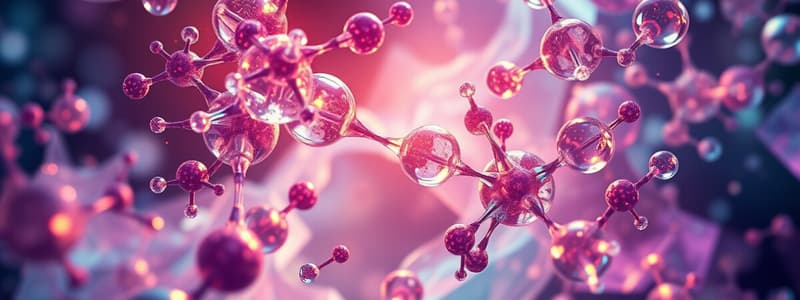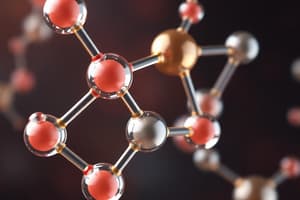Podcast
Questions and Answers
What was the primary source for the discovery of morphine?
What was the primary source for the discovery of morphine?
Which scientist is credited with the discovery of penicillin?
Which scientist is credited with the discovery of penicillin?
Which of the following properties is NOT associated with aspirin?
Which of the following properties is NOT associated with aspirin?
What is a common method used in drug discovery for identifying new compounds with biological activity?
What is a common method used in drug discovery for identifying new compounds with biological activity?
Signup and view all the answers
What is the significance of preclinical safety and toxicity testing in drug development?
What is the significance of preclinical safety and toxicity testing in drug development?
Signup and view all the answers
Which of the following is a method of drug discovery based on modifying existing molecules?
Which of the following is a method of drug discovery based on modifying existing molecules?
Signup and view all the answers
What contribution did Howard Flory, Ernst Chain, and Norman Heatley make to penicillin?
What contribution did Howard Flory, Ernst Chain, and Norman Heatley make to penicillin?
Signup and view all the answers
Which of the following is an example of a natural product used in drug discovery?
Which of the following is an example of a natural product used in drug discovery?
Signup and view all the answers
What is the primary use of Pilocarpine?
What is the primary use of Pilocarpine?
Signup and view all the answers
Which of the following is an indirect-acting parasympathomimetic?
Which of the following is an indirect-acting parasympathomimetic?
Signup and view all the answers
What class of drugs does Atropine belong to?
What class of drugs does Atropine belong to?
Signup and view all the answers
What effect does Atropine toxicity typically have?
What effect does Atropine toxicity typically have?
Signup and view all the answers
Which of the following is a cholinesterase regenerator?
Which of the following is a cholinesterase regenerator?
Signup and view all the answers
Which substances are included in the group of cholinesterase inhibitors?
Which substances are included in the group of cholinesterase inhibitors?
Signup and view all the answers
What condition is treated with ganglionic blockers like Hexamethonium?
What condition is treated with ganglionic blockers like Hexamethonium?
Signup and view all the answers
What is the general effect of sedative-hypnotics?
What is the general effect of sedative-hypnotics?
Signup and view all the answers
What is the primary mechanism of action of benzodiazepines?
What is the primary mechanism of action of benzodiazepines?
Signup and view all the answers
Which agent is classified as an antagonist that can reverse the effects of benzodiazepines?
Which agent is classified as an antagonist that can reverse the effects of benzodiazepines?
Signup and view all the answers
Which of the following benzodiazepines is classified as short-acting?
Which of the following benzodiazepines is classified as short-acting?
Signup and view all the answers
What is one of the primary concerns associated with the use of barbiturates?
What is one of the primary concerns associated with the use of barbiturates?
Signup and view all the answers
Which of the following is NOT a characteristic of barbiturates?
Which of the following is NOT a characteristic of barbiturates?
Signup and view all the answers
What is the duration of action for Phenobarbital?
What is the duration of action for Phenobarbital?
Signup and view all the answers
Which of the following drugs is considered an atypical sedative-hypnotic?
Which of the following drugs is considered an atypical sedative-hypnotic?
Signup and view all the answers
Which of the following statement about benzodiazepines and barbiturates is true?
Which of the following statement about benzodiazepines and barbiturates is true?
Signup and view all the answers
What is a key characteristic of salicylates?
What is a key characteristic of salicylates?
Signup and view all the answers
Which compound is primarily indicated for treating ankylosing spondylitis?
Which compound is primarily indicated for treating ankylosing spondylitis?
Signup and view all the answers
What is the mechanism of action for Sulindac?
What is the mechanism of action for Sulindac?
Signup and view all the answers
Which class of NSAIDs is primarily indicated for post-op pain?
Which class of NSAIDs is primarily indicated for post-op pain?
Signup and view all the answers
What distinguishes COX-2 selective inhibitors from other NSAIDs?
What distinguishes COX-2 selective inhibitors from other NSAIDs?
Signup and view all the answers
Which drug is considered a non-selective COX inhibitor?
Which drug is considered a non-selective COX inhibitor?
Signup and view all the answers
Which property is characteristic of propionic acid derivatives?
Which property is characteristic of propionic acid derivatives?
Signup and view all the answers
What is a common use for mefenamic acid?
What is a common use for mefenamic acid?
Signup and view all the answers
Which class of medications produces hypotension as a side effect?
Which class of medications produces hypotension as a side effect?
Signup and view all the answers
What is the primary mechanism of action for second generation antihistamines?
What is the primary mechanism of action for second generation antihistamines?
Signup and view all the answers
Which drug is considered a primary acid metabolite of hydroxyzine?
Which drug is considered a primary acid metabolite of hydroxyzine?
Signup and view all the answers
What characterizes dual acting antihistamines?
What characterizes dual acting antihistamines?
Signup and view all the answers
Which mast cell stabilizer is used topically for inflammatory diseases of the eye?
Which mast cell stabilizer is used topically for inflammatory diseases of the eye?
Signup and view all the answers
What effect do piperazine antihistamines like Cetirizine have on the blood-brain barrier?
What effect do piperazine antihistamines like Cetirizine have on the blood-brain barrier?
Signup and view all the answers
What is a notable side effect of dopamine antagonists?
What is a notable side effect of dopamine antagonists?
Signup and view all the answers
What is a characteristic feature of the second generation antihistamines compared to first generation?
What is a characteristic feature of the second generation antihistamines compared to first generation?
Signup and view all the answers
Study Notes
Organic Medicinal Chemistry Overview
- Focuses on the discovery and development of novel natural and synthetic organic compounds.
- Examines the effects of physiochemical properties on drug therapy.
Drug Discovery Process
- Natural Products: Includes fermentation broths, plant extracts, and animal fluids like snake venoms.
- Synthetic Medicinal Chemicals: Derived from project medicinal chemistry and combinatorial chemistry.
Historical Drug Discoveries
- Morphine: Alkaloid from poppy juice, discovered by Friedrich Wilhelm Sertürner in 1815.
- Penicillin: Discovered by Alexander Fleming in 1928 from mold; isolated by Howard Flory, Ernst Chain, and Norman Heatley in 1939, enabling clinical tests.
- Aspirin: Analgesic, anti-inflammatory drug derived from willow tree bark used since Hippocrates’ time for pain relief.
Drug Classification and Mechanism of Action
- Parasympatholytics: Include antimuscarinics which block muscarinic receptors; Atropine is a prototype used for cholinergic poisoning and bradycardia management.
- Cholinesterase Reactivators: Pralidoxime, used for organophosphate poisoning.
Sedative-Hypnotics
- Classified into benzodiazepines, barbiturates, and atypical agents.
- Benzodiazepines: Enhance GABA-mediated chloride ion channel opening; divided into short, intermediate, and long-acting categories.
- Barbiturates: Previously common sedatives with low safety margins; different durations of action including ultra-short, short, intermediate, and long-acting.
Anti-inflammatory Drugs
- Salicylates: Potent anti-inflammatories mainly targeting COX-1.
- Propionic Acid Derivatives: NSAIDs with analgesic and antipyretic properties; Naproxen shows slight COX-2 selectivity.
- Aril and Heteroaryl Acetic Acids: Indomethacin treats various arthritic conditions, while sulindac acts as a prodrug.
COX Inhibitors
- Selective COX-2 Inhibitors: Diaryl-5-membered heterocycles with similar therapeutic effects as NSAIDs; indicated for osteoarthritis, rheumatoid arthritis, and acute pain.
Antihistamines
- First vs. Second Generation: Second-generation antihistamines have reduced affinity for non-histamine receptors and are more selective for H1-receptors.
- Dual Acting Antihistamines: Block histamine release and action; examples include azelastine and ketotifen.
Mast Cell Stabilizers
- Cromolyn Sodium: Inhibits mast cell degranulation, used prophylactically for asthma.
- Lodoxamide Tromethamine: Prevents antigen-induced calcium influx leading to histamine release.
Notable Drug Examples
- Phenothiazines: Used as sedatives and antiemetics; includes Promethazine and Cyproheptadine.
- Benzodiazepine Reversal: Flumazenil acts as a benzodiazepine antagonist to reverse CNS effects.
Summary of Actions and Uses
- Sedative-Hypnotics: Induce CNS depressant effects through various mechanisms; essential for managing anxiety, insomnia, and convulsions.
- Antibiotics and Analgesics: Achieve therapeutic effects through inhibition of specific biological pathways; essential in pain management and infection control.
Studying That Suits You
Use AI to generate personalized quizzes and flashcards to suit your learning preferences.
Related Documents
Description
This quiz covers the essentials of Organic Medicinal Chemistry, focusing on the discovery and development of novel natural and synthetic organic compounds. It explores the effects of physiochemical properties on drug therapy and examines various sources of drugs, including natural products and synthetic methods.




